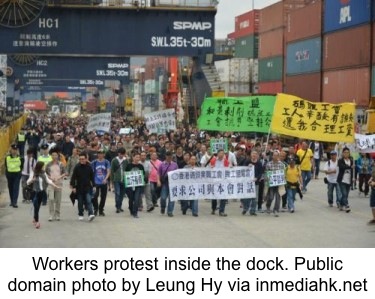Hong Kong Dockworkers Strike is Over!
The 40 day strike by the dockworkers slowing international shipping at the Kwai Chung cargo terminals in Hong Kong has come to an end.
 In the last blog I wrote about the strike drawing near an end, I looked at the weakening position of the strikers. Originally, they were seeking a pay rise between 17 and 23 percent. As it didn’t look likely they were going to achieve that kind of raise, Lee Cheuk-yan, the general secretary of the Hong Kong Confederation of Trade Unions said the subject was open to discussion but the dockworkers still wanted a pay percentage rise in the double digits.
In the last blog I wrote about the strike drawing near an end, I looked at the weakening position of the strikers. Originally, they were seeking a pay rise between 17 and 23 percent. As it didn’t look likely they were going to achieve that kind of raise, Lee Cheuk-yan, the general secretary of the Hong Kong Confederation of Trade Unions said the subject was open to discussion but the dockworkers still wanted a pay percentage rise in the double digits.
I asked the natural question. Would they accept an offer of only a 10 percent pay rise at that point?
The answer turned out to be yes. In fact, they even settled a little below that 10 percent mark.
On Friday, they were offered a raise of only 9.8 percent. That turned out to be enough and as of Saturday, the strike is over.
The Wall Street Journal reported:
“We think that it’s a victory for the workers to have successfully secured a pay rise with quite a good percentage increase—and that after our strike we got something—and also the union is strengthened,” Confederation of Trade Unions organizing coordinator Chan Chiu-wai said on Monday.[1]
But either the strikers original demands were intentionally inflated, giving a great deal of room for negotiation or they simply weren’t able to come close to getting the kind of results they’d hoped for.
The South China Morning Post called everyone a loser after the end of the Hong Kong dock strike.
They highlighted not only the workers getting less than half of the kind of pay rise they were looking for but the impact on the port and port operator Hongkong International Terminals (HIT).
HIT’s estimates that around 100 vessels avoided their terminals during the strike, wait time for vessels that did arrive went from the normal wait time of 3 hours to 20-25 hours, and the strike cost HIT millions of Hong Kong dollars per day.
HIT has not said how much this strike has cost them, but The South China Morning Post also recapped the estimates HIT made during the strike. During the first week, they said the strike was costing them HK$5 million a day and then a week later that amount fell to HK$2.4 million a day.
By my calculations, if those numbers are accurate, the strike cost HIT around HK$114.2 or over 14.7 million US dollars.
Potentially, there could be a much bigger loss in the future.
Apart from monetary losses, [Dr Paul Tsui Hon-yan] said the walkout had dealt a blow to the company’s image overseas. “If HIT wants to run more ports in other countries, the governments there may reject it because of its record,” he said. [2]
In the end, this strike is nothing that HIT will have trouble surviving. However, Global Stevedoring Service (Global), one of HIT’s contractors that had employed about 130 of the 450 striking dockworkers, did not. That company shut down last week, leaving the dockworkers who were employed by them unemployed after the strike.
The people left without jobs after a long, difficult strike process are the ones who are really hurt by this.
Despite headlines like the one from The South China Morning Post that call everyone a loser at the end of the strike, those strikers did not strike in vain.
Public awareness and support for the dockworkers was raised not just locally, but globally and an increase in wages and improvement in working conditions was achieved.
Whether it sounds fair or not, the raise that was won through the strike will be for workers at the dock who went on strike and those who did not, which is ultimately a good thing.
And Lee Cheuk-yan, a lawmaker with strike organiser Confederation of Trade Unions said “…it had made dockers and the public better understand their rights. The workers would now have more bargaining power in future talks over pay rises.”[3]
As for those 130 dockworkers now without jobs:
He [Lee] said he had asked the [Labour] department to press HIT on how many former Global dockers could be hired by other contractors. He insisted that HIT must ask the contractors to offer jobs to all former Global dockers. [4]
Our prayers here at Universal Cargo Management go out to those workers and their families. May all their jobs be restored with the better pay and working conditions for which they fought so hard.
![]()
Source: China

